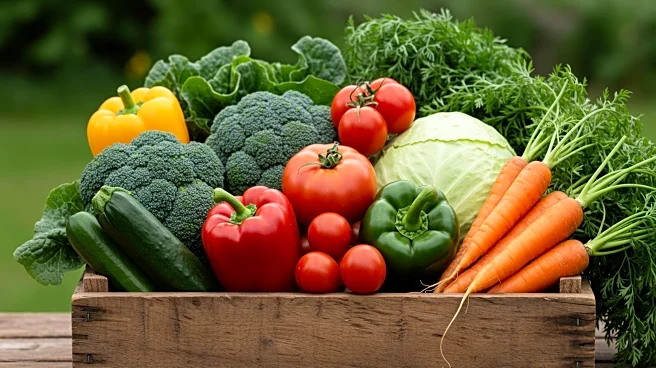What is the story about?
What's Happening?
Wholesale vegetable prices in the United States surged by 38% in July, marking the largest price increase for any product category, according to recent government data. This spike has raised concerns about potential increases in consumer prices for vegetables at grocery stores and restaurants. Analysts are examining various factors that could have contributed to this rise, including tariffs imposed by President Trump's administration, adverse weather conditions, and supply chain disruptions. The U.S. imports over a third of its fresh vegetables, making the category particularly susceptible to tariff-induced price changes. Additionally, the Trump administration's restrictive immigration policies may have led to labor shortages in agriculture, further impacting prices.
Why It's Important?
The significant increase in wholesale vegetable prices could have broader implications for the U.S. economy and consumers. If these wholesale price hikes translate into higher consumer prices, it could contribute to inflationary pressures, affecting household budgets and potentially altering consumer spending patterns. Businesses, particularly those in the food service industry, may face increased costs, which could impact their profitability and pricing strategies. The situation also highlights the interconnectedness of trade policies, immigration, and agricultural economics, underscoring the complexity of managing these sectors in a globalized economy.
What's Next?
If the current trend in wholesale price increases continues, consumers may begin to see noticeable price hikes for vegetables in the coming months. Analysts suggest that consumer price increases could exceed 10% if the wholesale trend persists. Stakeholders, including policymakers and industry leaders, will likely monitor the situation closely to assess the need for potential interventions or adjustments in trade and immigration policies. The ongoing debate over tariffs and their impact on the economy may intensify, with calls for reevaluation of current trade strategies.
Beyond the Headlines
The spike in vegetable prices also raises questions about the sustainability and resilience of the U.S. agricultural supply chain. The reliance on imported produce and the vulnerability to external factors such as tariffs and labor shortages highlight the need for strategic planning in the agricultural sector. Additionally, the situation may prompt discussions on the ethical and social implications of immigration policies, particularly concerning the agricultural workforce, which is heavily reliant on immigrant labor.
















